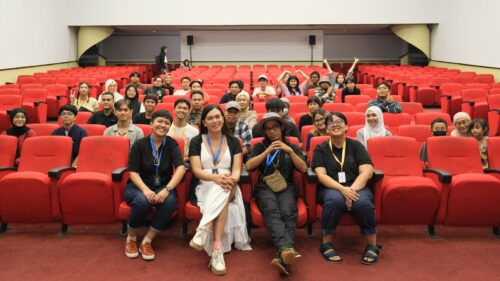DOC Talk titled Telusur Tutur, which was held at Ruang Rapat Taman Budaya Yogyakarta last Sunday, 3 November, toured the dynamics of aesthetics in documentary film, and takes a look at the particularly important role that personal positions and experiences of the filmmaker plays in the Indonesian documentary cinema. This talk plays a part in Festival Film Dokumenter 2024’s aim to explore the role of aesthetics, especially in the spaces between form and function and its relationship with the reflection of reality by the maker and the viewer’s interpretation.
Bangka-based Micko Boanerges shared his thoughts on the subject at DOC Talk Telusur Tutur. Director Boanerges often operates in the gray areas between reality and fiction in his filmmaking, with his film Sunshower (2024) exploring the realities of the Indonesian political landscape through the daily day-to-day activities of his grandparents in the countryside during the presidential elections. With his creative and scholarly work focusing on politics of form in Southeast Asian cinema, academic Dag Yngvesson serves as a more than suitable moderator for the subject matter.

The discussions of DOC Talk Telusur Tutur reflected on the core thematic and aesthetic attributes of Sunshower (2024), as well as aspects of Boanerges’ creative processes behind the film and his personal journey as student of Institut Kesenian Jakarta (IKJ). With Boanerges currently working on his own, it was another esteemed IKJ alumni’s final project which has become an inspiration for his escapades into the aforementioned gray area when it comes to aesthetics, documentary film and that of fiction, and its reinterpretation of reality.
“Sonata Kampung Bata, Riri Riza’s final project, is influential for me because it operates within the same (aesthetic) gray areas” Boanerges notes. Returning to Sunshower (2024), Boanerges discusses the different aesthetic elements found and how they are presented within the movie. There are three core themes which are discussed throughout disconnection, stagnation, and uncertainty; all aesthetically aligned with the political reality of Indonesia yet is presented through a personal lens. The slow pacing of Sunshower (2024), with its static scenes, is often discussed as being aesthetically symbolic to the political stagnation this country has seen since the reformation era after the New Order, and the political disconnect between the older and younger generations and the slow burn of the burdening uncertainty of the future.
“The aesthetic (of Sunshower) itself can be found in how the electoral situation (in Indonesia) is depicted by the uncertain time between summer and the monsoon seasons,” notes Boanerges on how the transitional season setting is a core aesthetic tenet of Sunshower (2024).

Through DOC Talk Telusur Tutur, we are presented with an intimate insight directly from a director talking about his work and his own aesthetical reflections throughout its process. After all, even from a filmmakers point of view, new aesthetic layers, through unnoticed nuances and unrealized standpoints of their own, can shape the movie even after the shooting, and are often only realized later in the process. “When I shot the movie, there must have been choices I made unconsciously, (that made me question) why did I shoot it like that? (My) beliefs are important too, (and although) at the time I couldn’t rationalize them, I (later) rationalized them during editing,” he adds.
At the end of the day, aesthetics can often define a film. After all, how can a slow paced documentary that depicts the day to day of an elderly couple, understand and depict so deftly the political undertones of Indonesia in its election cycle? As Boanerges explains about Sunshower (2024), “The aesthetics itself is what’s on offer. What’s on offer for when you watch (the film) is its representation of the context.”
Covered by Aradi Ghalizha on 3 November 2024 (Ed. Vanis)



